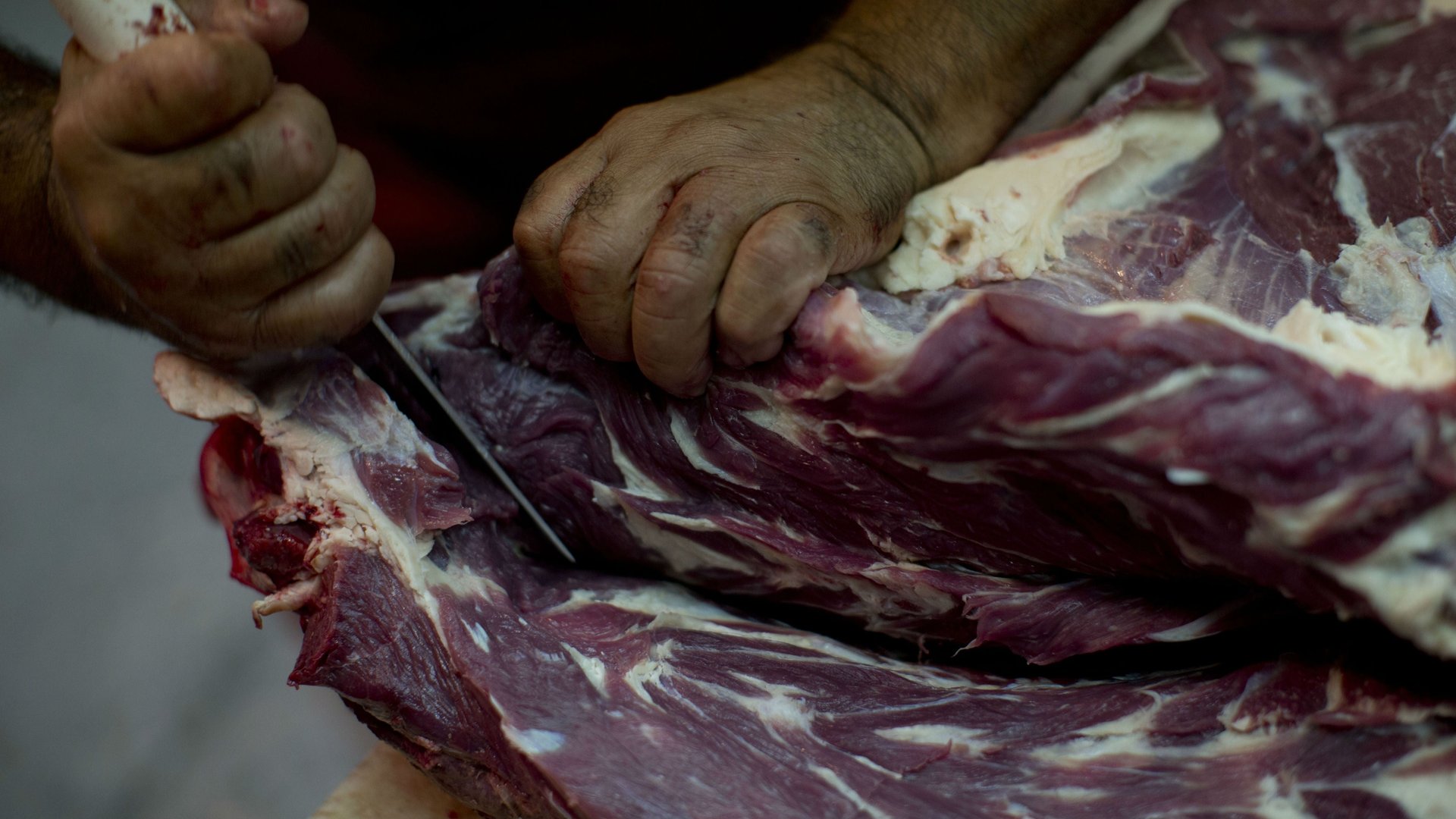The bizarre story of the 18th-century Frenchman who ate a quarter of a cow daily and never gained weight
The professionals who win eating contests have nothing on the talents of Tarrare, a Frenchman in the 18th century.


The professionals who win eating contests have nothing on the talents of Tarrare, a Frenchman in the 18th century.
Tarrare—which could have been just a nickname from the then-common French phrase “bom-bom tarrare!” used to describe explosions—was born in 1772 in Lyon, France. By the time he was 17, he was reportedly 100 pounds (about 45 kg), and consumed a quarter of a cow’s worth of beef per day. He ran away from home and joined a freak show, where he delighted attendees by eating anything—literally anything—they gave him, which ranged from a basket of apples, dozens of eggs, and even wine corks and flints.
Had you encountered Tarrare on the old Lyon streets, you probably wouldn’t have noticed him for his size (he reportedly was only average height with a thin frame), but you would smell him from afar. According to a delightfully disgusting account (see pages 203-205) published in the London Medical and Physical Journal in 1819, Tarrare was “constantly covered in sweat, and from his body…a vapor arose, sensible to the sight and moreso to the smell.” He had a wispy blond hair, and a large mouth surrounded by slender lips and discolored teeth. He frequently burped and farted, and had constant, particularly odorous bowel movements—which one would expect from someone whose diet consisted of massive amounts of both food and non-food items.
As Tarrare lived on, his appetite became even more bizarre. He joined the French military when the revolution began in 1789, although he didn’t fight. He helped out his fellow soldiers carry out day-to-day tasks, and then ate their rations as compensation. He ended up in the military hospital because no matter what he ate, his appetite was insatiable. Here, he amazed army physicians by putting away not only his quadrupled rations, but also gauze intended for healing wounds and live animals, including cats, dogs, snakes, and eels (the last of which he allegedly never even chewed).
One of the surgeons noticed Tarrare’s remarkable capacity, and as a test, had him eat a wooden box—presumably small enough to be swallowed, although the exact size isn’t stated in the London Journal—with a sheet of paper in it. When Tarrare successfully passed the box with the paper unharmed, doctors gave him a message in the same box to send to captured French soldiers being held in Prussia. Posing as a peasant, Tarrare made it across the border, but was quickly discovered to be an imposter because he didn’t speak German. The Prussian army captured and tortured him, and, according to the London Journal account, “Tarrare voided the wooden case…and had the address to swallow it again to conceal the knowledge of its contents from the enemy.”
Fortunately, Tarrare escaped back to France. Doctors tried to treat him with tobacco and opioids (they weren’t too far off there—opiates do cause constipation at the very least), but during his time at the hospital, staff found him drinking patients’ drained blood and even eating their corpses. He was finally kicked out in 1794 when a 14-month-old mysteriously went missing.
Tarrare fell off the radar for the next four years. When he died at the age of 26 in Versailles from tuberculosis, doctors performed a brief autopsy. They found that his stomach took up most of his gut, aside from his massive, fatty liver. His remaining organs were decaying; it smelled so bad the chief surgeon of the hospital called off the operation before they could look any further.
It’s clear that Tararre had some kind of polyphagia, a medical condition characterized by uncontrollable hunger and eating. Usually, polyphagia is a symptom of a more serious underlying problem. Syndee McElory, a physician based in Huntington, West Virginia suggests that it could have been hyperthyroidism, which increases metabolism, and causes diarrhea, sweating, and thin hair—all of which match descriptions of Tarrare. “That being said, generally we don’t accept that it also makes you eat live animals and drink human blood,” she said in an episode of Sawbones, a medical history podcast she co-hosts. Others have speculated that Tarrare’s uncontrollable appetite may have been a result of a brain injury to or tumor in either the amygdala or hypothalamus, both of which play a role in appetite.
Of course, in medicine, one diagnosis may not be enough. As influential physician and academic John Hickam once said, “Patients can have as many diseases as they damn well please.” (This phrase is affectionately called “Hickam’s Dictum,” and is often presented in medical contexts as a counter argument to Occam’s Razor.) In other words, it could have been a combination of any number of conditions that caused Tarrare’s strange behavior.
Jan Bondeson, a medical historian at the University of Cardiff in Wales who has written a book about Tarrare and other medical oddities, says we probably won’t see anything like him again. Medicine has improved greatly since the 18th century, and anyone like Tarrare would hopefully be diagnosed and treated appropriately before things spiralled out of control. But also, our interests have changed. “The working man’s pastimes were completely different,” he says. “Instead of sitting in front of the computer, they [used to] like brutal and unsavory amusements like…watching Tararre eat a cow’s udder. He was a product of his time.”